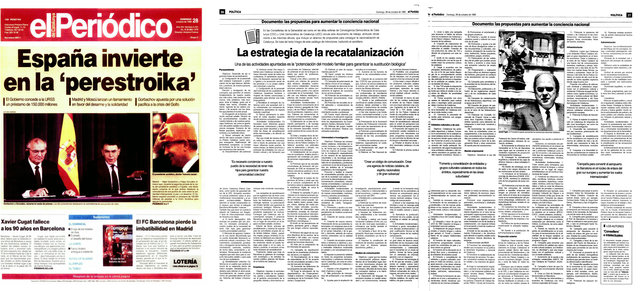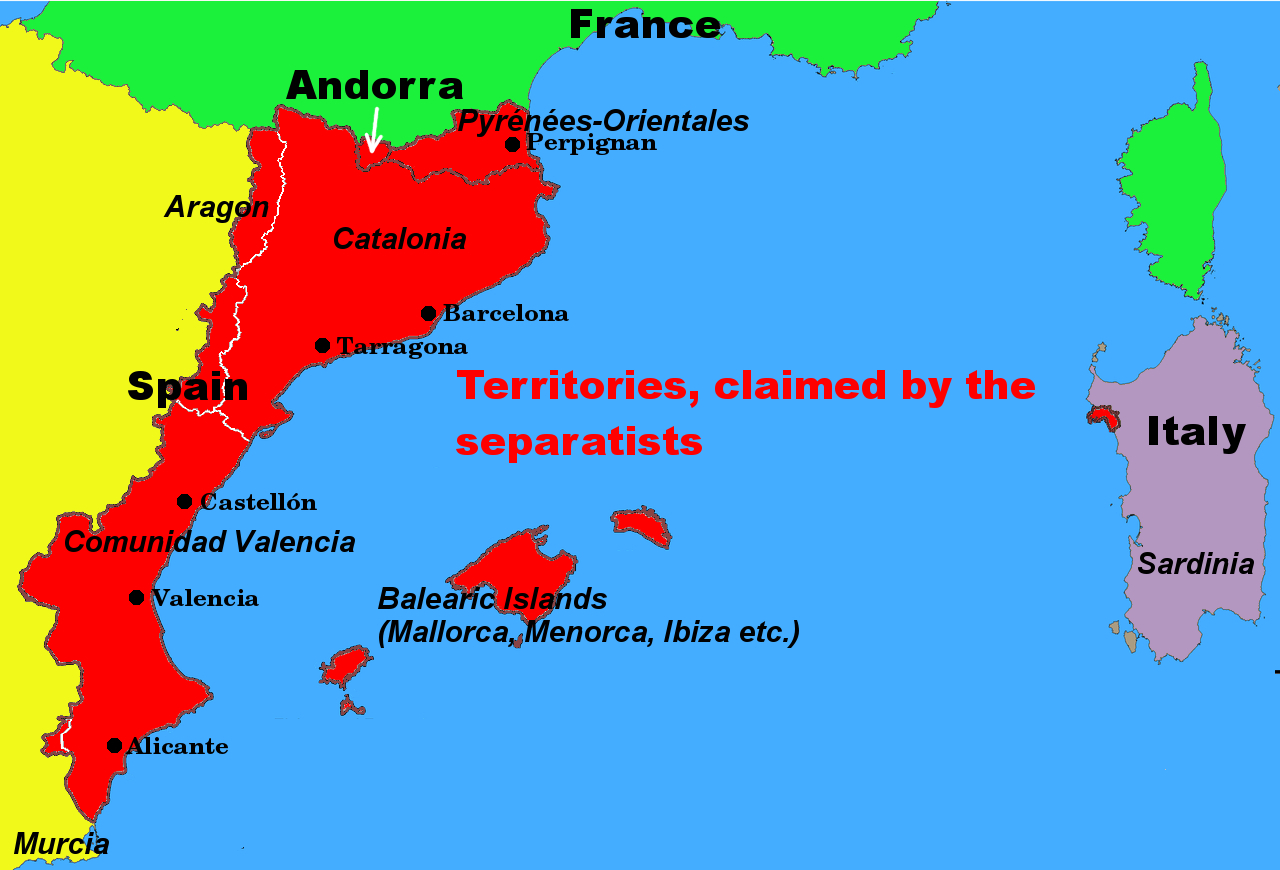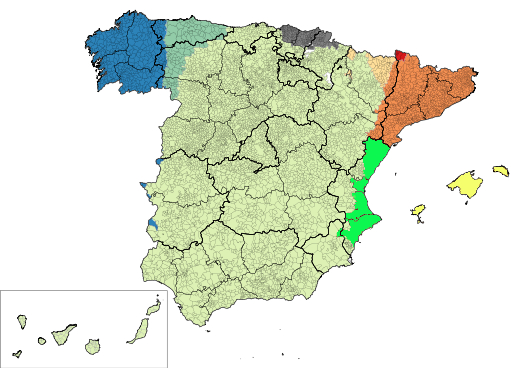Extreme Spanish nationalists act like the CDR
Amnesty or deal?
November 9, 2023
The socialist Spanish President Pedro Sánchez (PSOE) has negotiated an amnesty with the leader of Junts (conservative separatists), Carles Puigdemont, so that Junts will give him their vote in the parliamentary re-election on November 27.
Protests against such an amnesty have been taking place for days by conservative Spanish nationalists all over Spain, which have now been used by fascist elements to use massive violence in front of the PSOE headquarters in Madrid. This is a situation that we are otherwise familiar with from the separatist CDR (Comités de Defensa de la República) in Barcelona.
But there are also calls for demonstrations in Valencia against the amnesty and attempts to be taken in by the Catalan separatists (No als Països Catalans). There are even fears that Sánchez wants to grant the separatists an unconstitutional referendum in order to maintain his power.
Will this deal help resolve the Catalonia conflict?
In October 2019, shortly after the sentencing of the separatist leaders, I commented on the issue of amnesty. I made it clear that amnesty is a unilateral act of mercy (mercy before justice), because human justice is never perfect. Amnesty in politics allows the possibility of reaching a political solution over this imperfection. This is particularly true when, as here in the Catalonia conflict, those convicted are the leaders of a large minority and this minority has thus been 'morally' condemned at the same time with the legal verdict.
The Spanish parliamentary elections in July this year did not result in clear majorities, neither for the conservatives nor the socialists. Conservative Alberto Feijóo's attempt to be elected president failed due to these circumstances and Sánchez will fail if he does not succeed in winning over the Catalan separatists.
Junts' demands from the outset were an amnesty and a referendum on independence. With the announcement of a possible agreement, the conservatives initiated a movement against the amnesty and thus probably also have a certain amount of support among PSOE voters. This was obviously a successful move, because ultimately it is not about an amnesty, but about the presidency.
The question of amnesty is very emotionally charged. My feelings, too, tend to give me a desire for revenge and the darkest thoughts when I think, for example, of the suffering that the separatists are bringing upon schoolchildren and students in particular with their language imposition. But emotions and revenge in politics only lead to aberrations, to escalation and neither to a compromise nor to a sustainable peace. In this respect, the violent riots of the extreme Spanish nationalists are only a logical consequence.
It is important to bear in mind that the intended amnesty is not an amnesty, i.e. a unilateral act of mercy. It is a political deal and without any moralizing, nothing else.
I doubt that this deal contains the seeds of a political solution to the conflict in Catalonia. We will see on November 27 whether it secures Sánchez's presidency.
Other opinions of unionists
This blog only exists because I am in touch with unionists. They do not necessarily agree on the amnesty deal. I would like to quote two of these statements without claiming to be representative:
Antonio wrote to me in 2019 in response to my article mentioned above: „You tell me: 'We have to fight for peaceful solutions' and then: 'It's not fair, it sucks, but that's life.' But if you surrender completely and accept everything the other party wants to do now and in the future, you will certainly have PEACE. I prefer to fight for JUSTICE, even if I don't have peace.
Although I do not agree with your idea, that is, I do not respect it but fight it, I will always stand up for you to express it, because it is fair that all people can express their ideas.“
Jaime wrote to me a few days ago: „The 'why amnesty now ?' has a second reason: about 35-40% of Catalans feel it was a collective humiliation (in addition to a sentence penalising the behaviours of a dozen people). Such 35-40% actually sympathise with 'sovereignist beliefs'... even if the separatist leaders are burned in the eyes of most people who are separatist (and not only those who are not), since they are blamed by them for having lied to their followers, making them believe that the road to independence was fully paved and cleared and that Nirvana was to be reached in few days, hours even.. until they actually did declare the Catalan Republic on Oct. 1st 2017, loudly announcing 'we made it'!
As you know few humans admit being fools.. preferring to blame demagogues for having 'lied to them'. I imagine something of the sort may have happened in Germany post 1945 ('I am not a fool, I was just lied to').
The reasons why I therefore believe we have a collective interest in closing this issue is because only now we could achieve it. The independence movement failed, it´s without any momentum and many people who voted for them no longer do so. The perpetrators went to jail for 4 years (those guilty of misdoings not those who are for independence) and their voting scores have done nothing but diminish over time (25% in the last general election on July 23 vs. 48% of casted votes in the prior one). ..except to the benefit of the left and not of the PP and Vox.“
| | | | Click here to subscribe or cancel your subscription |
Myths and deceptions of Catalan nationalism

Here you'll find the translation
Languages in Spain
Spanish, Basque, Catalan, Mallorquin, Valenciano etc.
The strategy of recatalanization
 1980 the Spanish journal "El Periodico" published a secret document about the strategy of the Catalan government. It shows in a frightening way the actual spiritual world of the separatist leaders.
1980 the Spanish journal "El Periodico" published a secret document about the strategy of the Catalan government. It shows in a frightening way the actual spiritual world of the separatist leaders.Now it is available in english translation.
Pancatalanism
the separatist's imperial claim
 The Catalan government exports the conflict into communities with Catalan population, supporting all efforts of the separatists including financial means to destroy Spain.
The Catalan government exports the conflict into communities with Catalan population, supporting all efforts of the separatists including financial means to destroy Spain. An important tool is the establishment of a language dictatorship that is not afraid to use the same means as Franco.
Separatist indoctrination

Click here to read the study
Language imposition and democracy

An essay in 6 parts on the potentially violent effect of language imposition containing contributions from South Africa, Catalonia, Ukraine and France.
go to part 1 SticSti
Publications
 The title says: "Catalonia, a conflict is exported. Insights of a migrant"
The title says: "Catalonia, a conflict is exported. Insights of a migrant"Sorry, up to now, this book is only available in German. However, drop us a line, if you are interested to learn more Contact.

